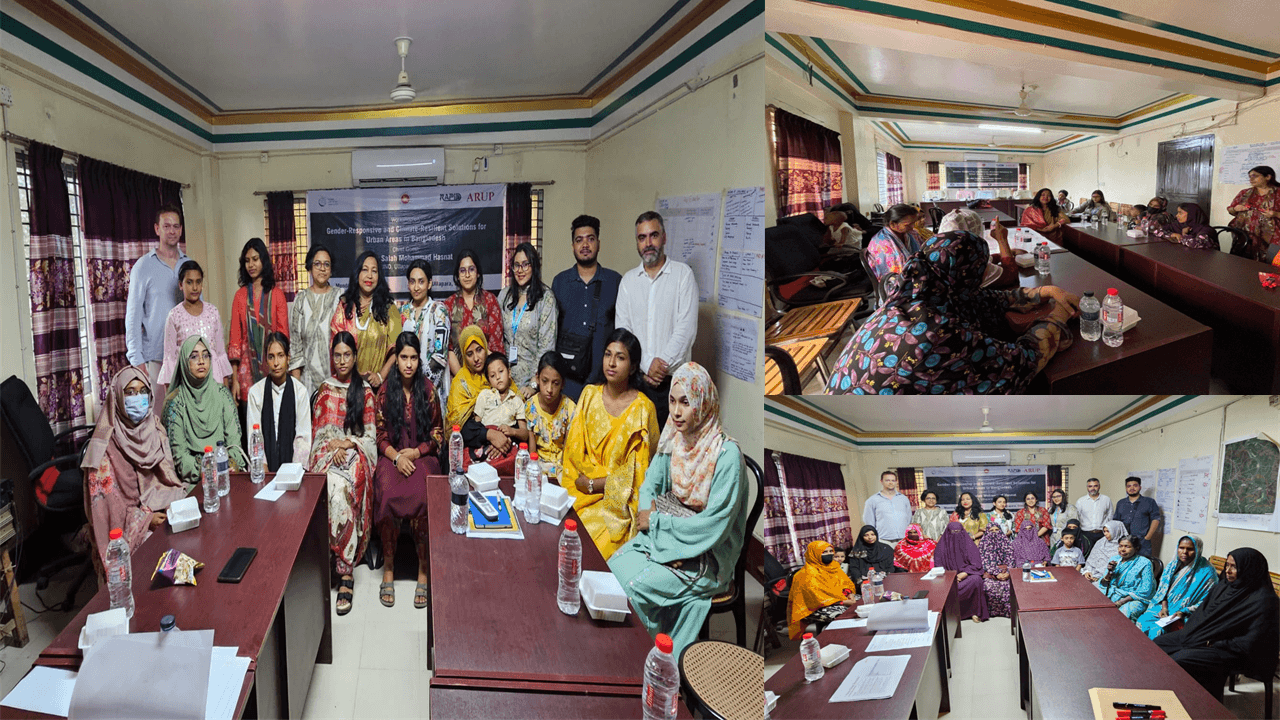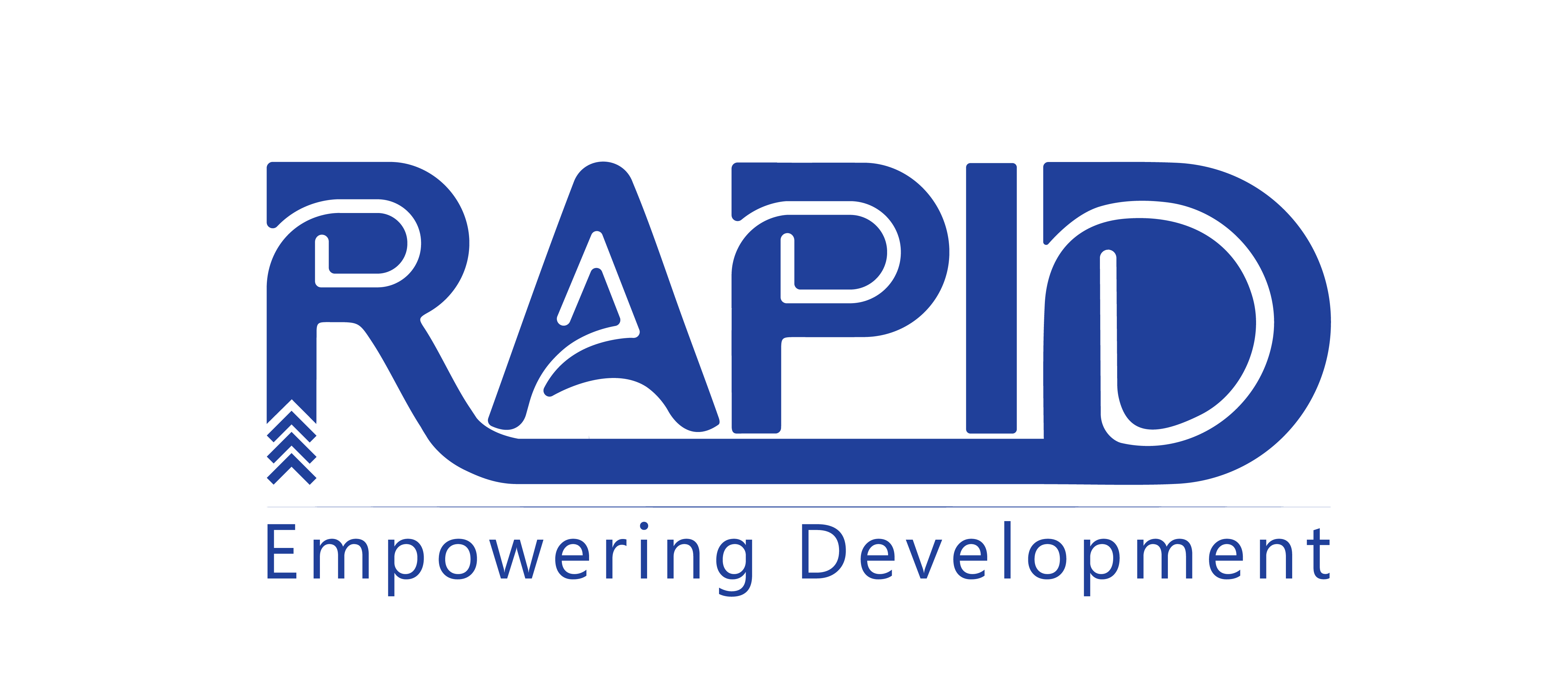
RAPID Data Center_Ok

Trump’s Tariffs: Redefining the Global Trade Landscape.
Assessment of Skills Demand and Skills Gaps in the Business Process Outsourcing (BPO) Industry of Bangladesh
Gender-Responsive and Climate-Resilient Solutions for Urban Areas in Bangladesh
Contents
About the project
Partner:Global Center on Adaptation (GCA) and KfWProject duration: May 2025- February 2026
This study, led by Arup and RAPID, aims to develop gender-responsive and climate-resilient solutions for urban areas in Bangladesh. It focuses on five pourashavas under the UCRIP-II programme to improve infrastructure planning by integrating gender and climate vulnerability considerations. The initiative is supported by the Global Center on Adaptation and aligns with national development goals and KfW financing priorities.
Objectives of the Assignment:
- To identify gender-specific vulnerabilities to climate risks in urban areas, with a focus on infrastructure access in both formal and informal settlements.
- To assess key climate hazards across five target pourashavas and recommend locally tailored, gender-responsive solutions eligible under UCRIP-II.
- To develop a results chain and monitoring indicators linking gender gaps with adaptation investments, and provide operational guidance for pourashavas.
- To design basic guidelines for prioritised, climate-resilient urban infrastructure improvements.
Project activities
Validation Workshop: Gender-Responsive and Climate-Resilient Solutions for Urban Areas in Bangladesh
On 17 December 2025, a team led by Dr M Abu Eusuf, Executive Director, RAPID and Professor of Development Studies at the University of Dhaka, conducted a validation workshop focusing on the pourashava-specific findings from the study on Gender Responsive and Climate Resilient Solutions for Urban Areas in Bangladesh.
The event, held in Derai, Sunamganj was joined by representatives from the government, NGOs, and local leaders who shared valuable insights into local challenges and opportunities for building more inclusive and climate-resilient urban futures.
This project is commissioned by the Global Center on Adaptation and is being implemented in collaboration with Arup.
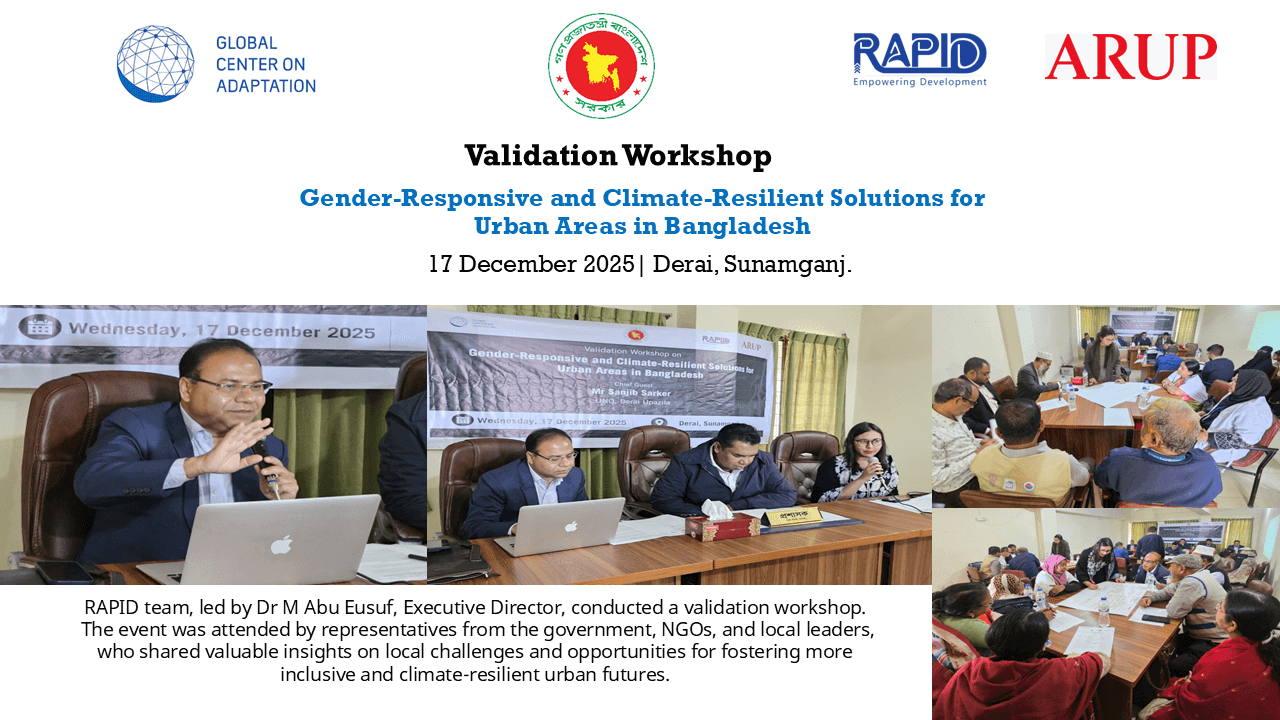
Validation Workshop: Gender-Responsive and Climate-Resilient Solutions for Urban Areas in Bangladesh
On 10 December 2025, a team led by Mr Jahid Ebn Jalal, Deputy Director, RAPID, conducted a validation workshop focusing on the pourashava-specific findings from the study on Gender Responsive and Climate Resilient Solutions for Urban Areas in Bangladesh.
The event, held in Ullapara, Sirajganj, was joined by Mr A T M Arif, UNO, Ullapara, who shared valuable insights into local challenges and opportunities for building more inclusive and climate-resilient urban futures.
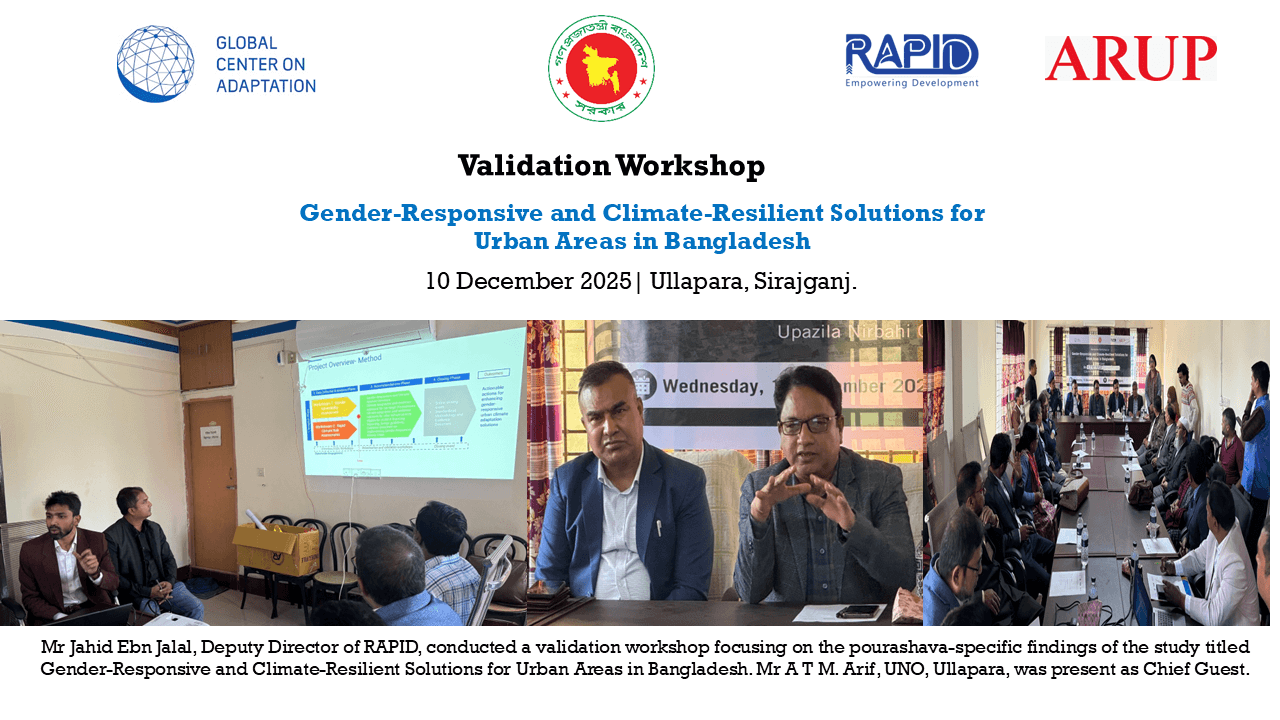
Validation Workshop: Gender-Responsive and Climate-Resilient Solutions for Urban Areas in Bangladesh
RAPID Executive Director and Professor at University of Dhaka, Dr M Abu Eusuf, along with the RAPID research team, visited Bakshiganj, Jamalpur, on 3 December 2025 to validate findings from our previous field visit on gender-responsive and climate-resilient solutions for urban areas in Bangladesh. Mr Jahid Ebn Jalal, Deputy Director, RAPID, presented the key findings. We were joined by Ms Asma Ul Hosna, Administrator, Bakshiganj Municipality, who shared valuable insights on local challenges and opportunities for building more inclusive and climate-resilient urban futures.
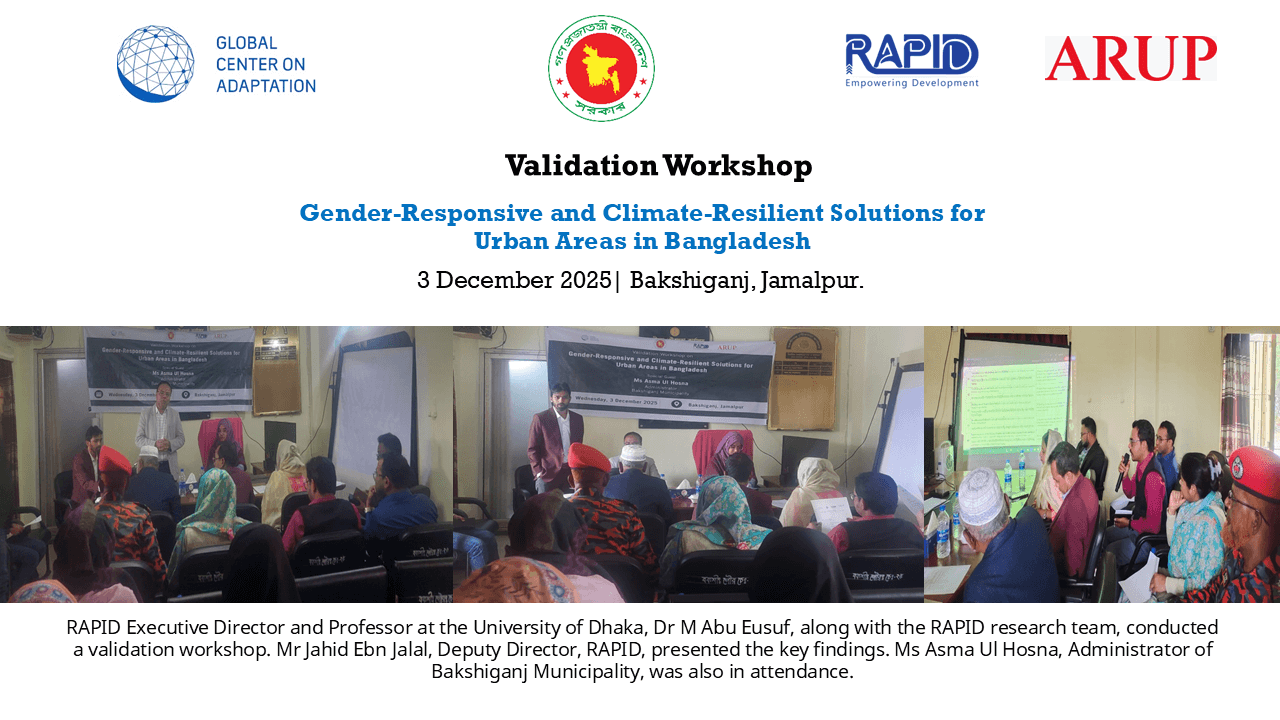
Focus Group Discussions and Workshop: Gender-Responsive and Climate-Resilient Solutions for Urban Areas in Bangladesh
RAPID, commissioned by the Global Center on Adaptation (GCA), held its fifth pourashava field engagement in Bakshiganj, Jamalpur on 28–29 September under the Gender-Responsive and Climate-Resilient Solutions for Urban Areas in Bangladesh initiative. The field team was led by Dr M Abu Eusuf, Executive Director of RAPID and Professor of Dhaka University. The second day consultation was inaugurated by Ms Asma Ul Hosna, Respected Administrator of Bakshiganj Municipality.
FGDs, KIIs, and a multi-stakeholder workshop revealed critical housing, sanitation, drainage, and waste management challenges—made worse by climate hazards such as extreme heat, floods, etc. Community and municipal voices together outlined pathways for more inclusive and resilient urban systems.
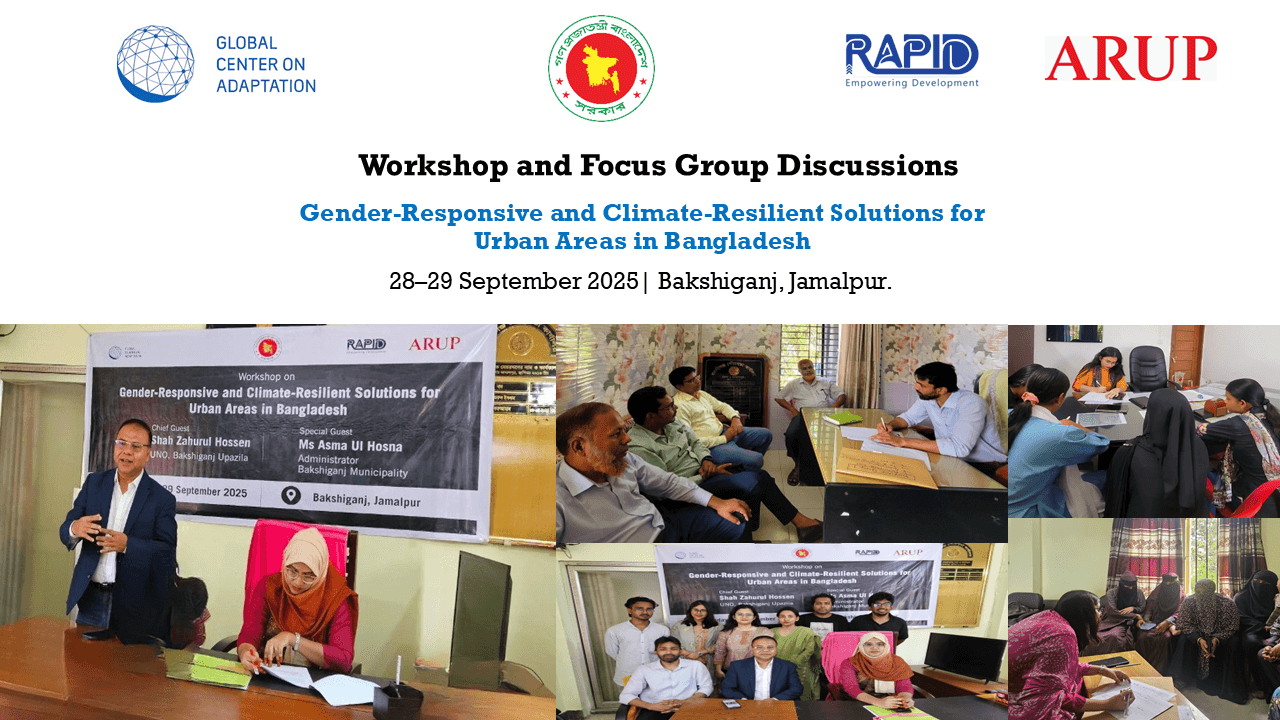
Workshop: Gender-Responsive and Climate-Resilient Solutions for Urban Areas in Bangladesh
On 18 September 2025, RAPID, in collaboration with Arup, hosted a workshop in Derai Pourashava of Sunamganj with local government officials, service providers, departmental representatives, and community stakeholders to identify vulnerabilities and infrastructure challenges at the intersection of climate hazards and gender.
The discussion highlighted how women and marginalised groups in the haor region face disproportionate risks during floods and storms, such as limited access to safe shelters, heightened exposure to health hazards, increased burden of caregiving, loss of livelihood opportunities and challenges in accessing essential services like water and sanitation. It brought together voices from both formal institutions and informal groups to ensure these realities are addressed in planning.
From our experts team, Dr Anwar Hossen, Professor of Dhaka University, facilitated the workshop with us. We were graced by the presence of Mr Sanjib Sarker, Hon’ble UNO of Derai Pourashava.
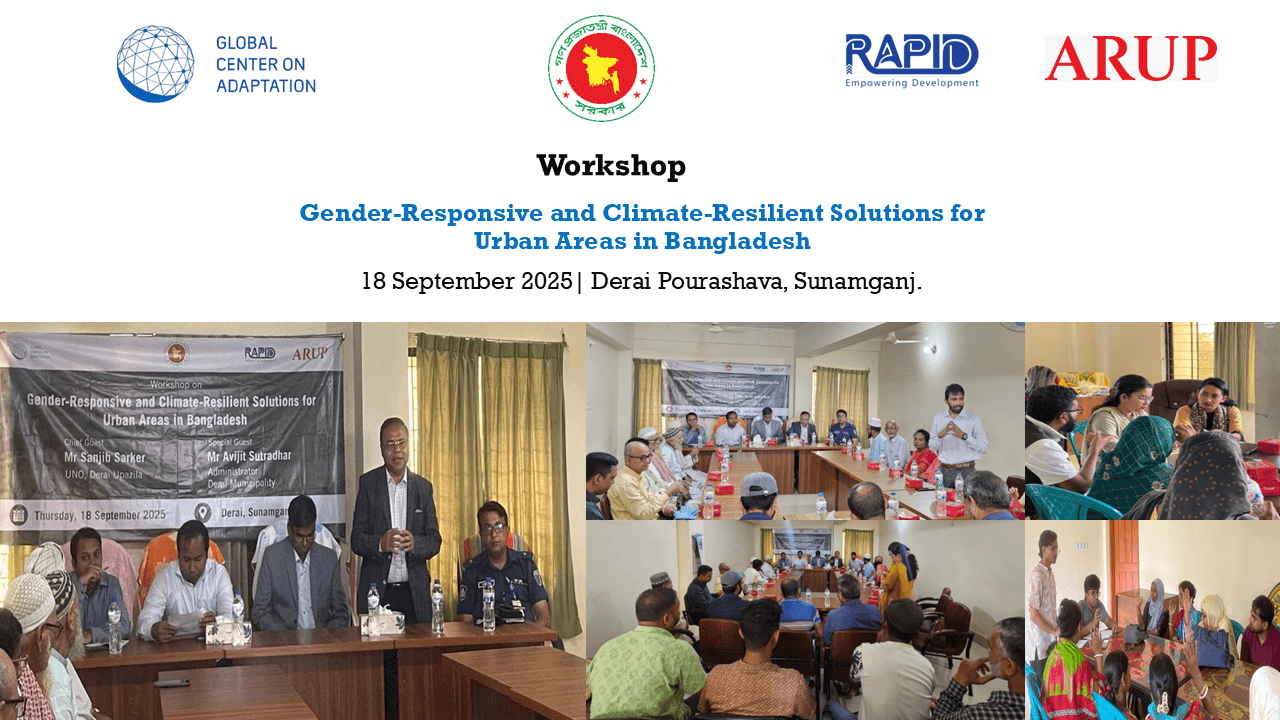
Workshop: Gender-Responsive and Climate-Resilient Solutions for Urban Areas in Bangladesh
On 11 September 2025, RAPID, in collaboration with Arup, hosted a workshop in Shahrasti Pourashava with local government officials, service providers, departmental representatives, and community stakeholders to identify vulnerabilities and infrastructure challenges at the intersection of climate hazards and gender. The discussion brought together voices from both formal institutions and informal groups. We were graced by the presence of Ms Najia Hossain, Hon'ble UNO of Shahrasti Upazila.

Focus Group Discussions and Workshop: Gender-Responsive and Climate-Resilient Solutions for Urban Areas in Bangladesh
RAPID convened a two-day field engagement in Baraigram, Natore, on 20–21 August 2025 under the initiative Gender-Responsive and Climate-Resilient Solutions for Urban Areas in Bangladesh, in collaboration with ARUP, commissioned by the Global Center on Adaptation (GCA).
The first day featured Focus Group Discussions (FGDs) with working women, youth, the elderly, and persons with disabilities, alongside Key Informant Interviews (KIIs) with municipal and community stakeholders. These sessions provided grounded insights into how rapid urbanisation and climate change are shaping vulnerabilities across social groups.
The second day culminated in a multi-stakeholder workshop, inaugurated by Ms Laila Jannatul Ferdous, Upazila Nirbahi Officer, Baraigram, as Chief Guest, and attended by local government officials, municipal leaders, and community representatives. Deliberations focused on practical strategies to strengthen urban resilience while embedding gender equality and inclusion in local planning and service delivery.
The discussions will contribute to evidence-based recommendations for building sustainable and climate-resilient urban systems in multiple pourashavas in Bangladesh.
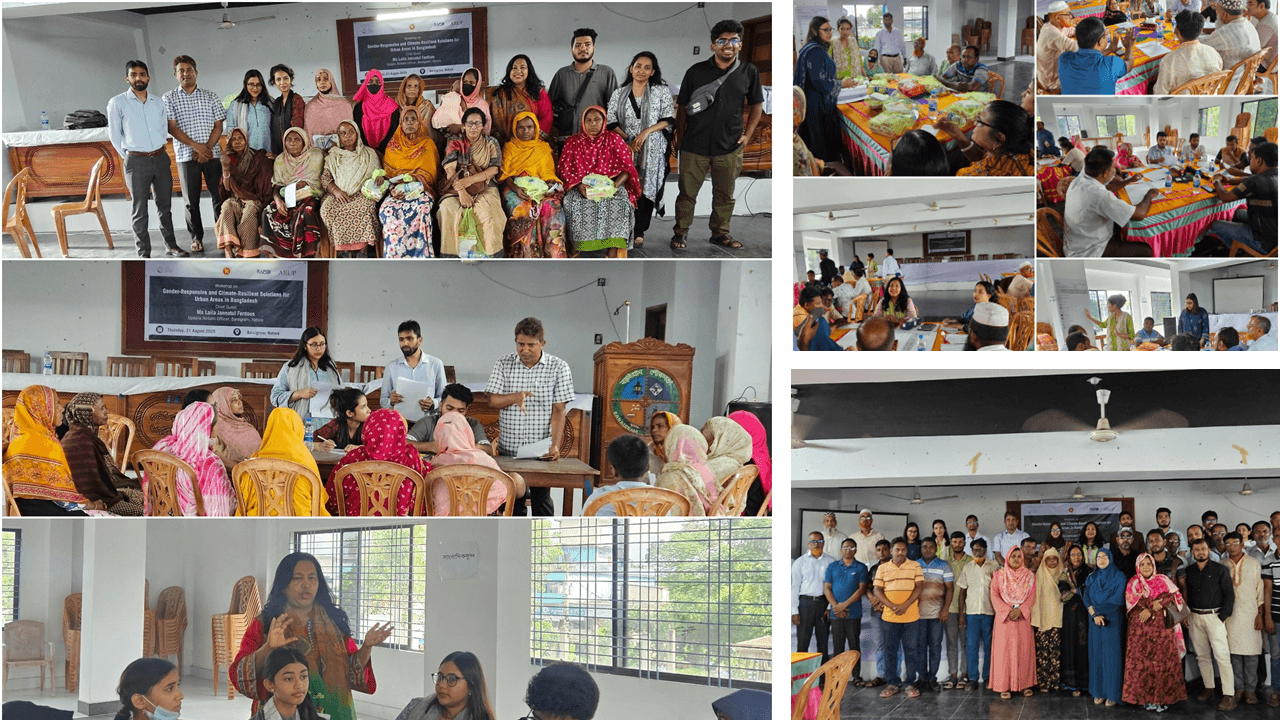
Workshop: Gender-Responsive and Climate-Resilient Solutions for Urban Areas in Bangladesh
On 4 August 2025, RAPID, in collaboration with Arup, hosted a workshop in Ullapara with Mr Abu Salah Mohammad Hasnat, Upazila Nirbahi Officer (UNO), as Chief Guest; Dr M Abu Eusuf, Executive Director, RAPID, as the keynote speaker; and experts including Professor Salma Akhter, Professor Nazrul Islam, and Mr Mike Henderson from the Global Center on Adaptation (GCA). Following the workshop, a focus group discussion was held with local officials, who presented their work and shared insights. The session included participatory exercises to promote active engagement and collaborative problem-solving.
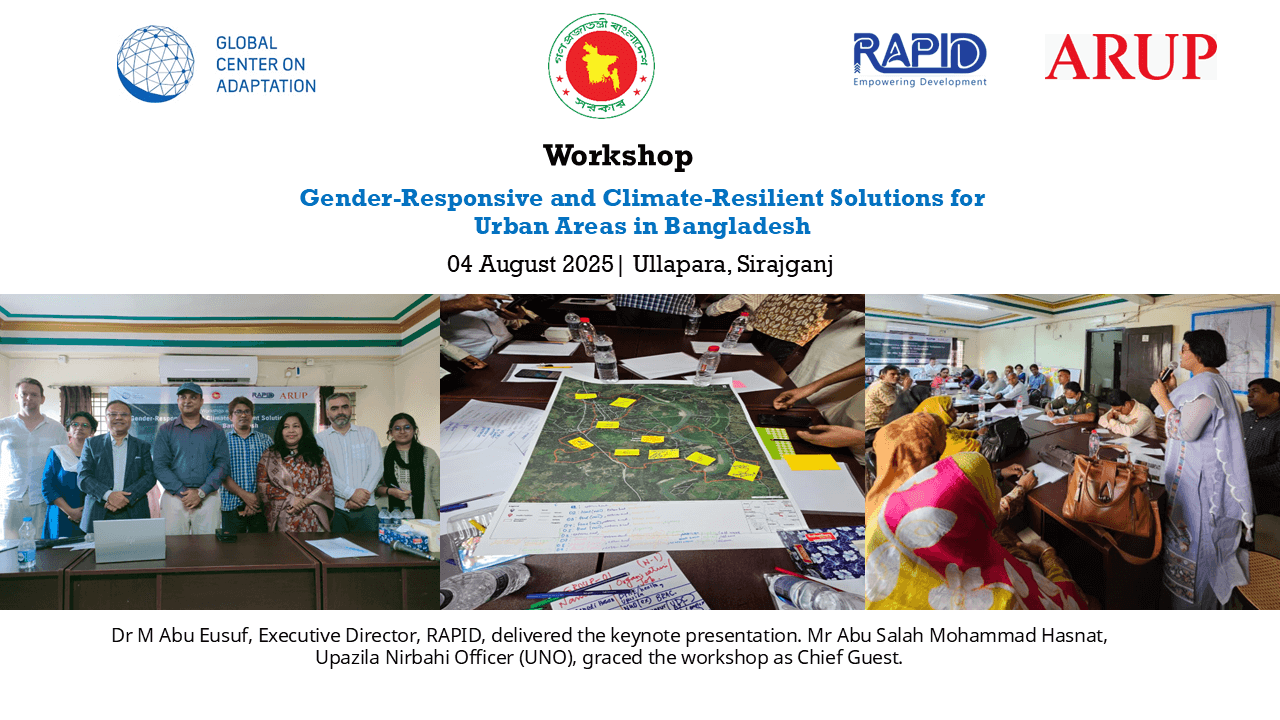
Focus Group Discussions : Gender-Responsive and Climate-Resilient Solutions for Urban Areas in Bangladesh
On 3 August 2025, RAPID, in collaboration with ARUP, conducted three focus group discussions in Ullapara Pourashava, Sirajganj, engaging working women, youth and adolescents, elderly women, and women with disabilities. The sessions aimed to assess how climate hazards affect their daily lives and to identify priority areas for intervention. The discussions placed particular emphasis on climate adaptation and resilience strategies with a strong gender focus. Additionally, the teams conducted two key informant interviews (KII) with local community leaders.
